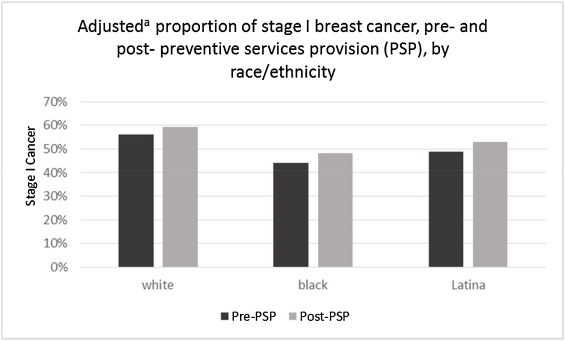US Navy
That more breast cancers are being detected early in the years following passage of the Affordable Care Act in the United States shouldn't be a terribly surprising finding. Not only do more people have health insurance now than they did five years ago, the health insurance they do have is legally required to cover—without the barriers of copayments or out-of-pocket costs—a suite of 45 basic preventative services, including mammograms.Indeed, a new study published in the journal Cancer Epidemiology notes a significant uptick in diagnoses of Stage 1 breast cancer in the post-ACA years 2011-2013 compared to 2007-2009, before the Act took effect. Specifically, the percentage of breast cancers detected before progressing beyond Stage 1 increased from 54.4 percent to 58.0 percent, according to a survey of some 470,465 breast cancer patients between the ages of 50 and 74. A corresponding downturn in Stage 2 and 3 diagnoses was seen during the same period. "While the shift in stage I cancers was modest, it translates into a potentially significant public health impact," the study notes. "Given that approximately one-quarter of a million women in the US are diagnosed with breast cancer yearly, a small shift toward stage I diagnoses would improve the prognosis for thousands of women. Additionally, it would reduce the need for invasive treatments such as chemotherapy for a substantial number of women."According to the American Cancer Society, the survival rates from Stage 1 breast cancer to Stage 3 breast cancer decline from nearly 100 percent to 73 percent.Mammograms are one of 45 essential health benefits covered by the Affordable Care Act. Basically, if you're selling health insurance in the United States, you need to cover these 45 things and do so without charging upfront costs. Under both the House and Senate proposals to replace the ACA, this provision would be left to state governments to decide. In other words, federal law would no longer require the provision of mammograms and other preventive services.
"While the shift in stage I cancers was modest, it translates into a potentially significant public health impact," the study notes. "Given that approximately one-quarter of a million women in the US are diagnosed with breast cancer yearly, a small shift toward stage I diagnoses would improve the prognosis for thousands of women. Additionally, it would reduce the need for invasive treatments such as chemotherapy for a substantial number of women."According to the American Cancer Society, the survival rates from Stage 1 breast cancer to Stage 3 breast cancer decline from nearly 100 percent to 73 percent.Mammograms are one of 45 essential health benefits covered by the Affordable Care Act. Basically, if you're selling health insurance in the United States, you need to cover these 45 things and do so without charging upfront costs. Under both the House and Senate proposals to replace the ACA, this provision would be left to state governments to decide. In other words, federal law would no longer require the provision of mammograms and other preventive services.
Advertisement

